Reply To:
Name - Reply Comment
Last Updated : 2024-04-25 13:23:00
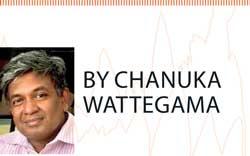 Digital technology, remarks New Zealand’s economic development minister, creates opportunities across all economic activities – businesses need to succeed, grow and add jobs, export markets, investment, innovation, skilled and safe workplaces, natural resources and infrastructure.
Digital technology, remarks New Zealand’s economic development minister, creates opportunities across all economic activities – businesses need to succeed, grow and add jobs, export markets, investment, innovation, skilled and safe workplaces, natural resources and infrastructure.
The technology sector is an important driver of innovation and increases in jobs and export growth and application of technology across all sectors of the economy can make businesses more resilient, productive and internationally competitive. Digital transformation comes naturally. The only questions are: How fast and what exactly could it mean to us?
Closer to home, the McKinsey report on ‘Digital India’ elaborates how digital applications could proliferate across most sectors of India’s economy. By 2025, it says, the core digital sectors such as IT and business process management, digital communication services and electronics manufacturing could grow from US $ 355 billion to US $ 435 billion, i.e. more than four times the GDP of Sri Lanka.
Newly digitalising sectors, including agriculture, education, energy, financial services, healthcare, logistics and retail, as well as government services and labour markets, could each create US $ 10 billion to US $ 150 billion of incremental economic value in 2025, as digital applications in these sectors help raise output, save costs and time, reduce fraud and improve matching of demand and supply.
Despite what we often hear, Sri Lanka’s position in the digital map is not that impressive, even as a developing nation. Internationally, seven tech brands top the list of most valuable ones (Amazon, Apple, Google, Microsoft, Samsung, AT&T and Facebook). The local tech brands come nowhere near top.
Earning from the telecommunication, computer and information services sector still remains slightly lower than US $ 1 billion – too tiny to be noticed in a US $ 4 trillion global market. Sri Lanka ranks number 109, out of 140 countries, in the World Economic Forum’s ICT adoption index. In terms of digital skills among population, we were at the 85th position. The total ICT workforce still remains less than 100,000. It is high time somebody lift these figures upscale.
This article comparatively analyses what each possible contender for Presidential Election 2020, in terms of what they have so far contributed and what they could deliver in the future, making Sri Lanka a truly digitally prepared nation – perhaps the first one to be so in South Asia.
The same list I have considered earlier has been taken into account. The asymmetry in content reflects differences in input. However, despite its importance, this is only one criterion to be considered when choosing a national-level leadership.
Basil Rajapaksa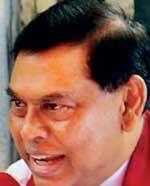
Having held the powerful portfolio of economic development for nearly five years, Basil Rajapaksa might have played a key role in shaping the digital pathway of the nation. Still his involvement does not seem to be too visible. For example, web has almost no information. This could be for a good reason. The information and communication technology (ICT) agenda was then almost fully driven from the President’s Office. It is possible that his role could have been dwarfed in the presence of a story too big.
While he is better known for his capabilities managing development activities at ground level – particularly rural development – there is nothing to suggest he is a tech averter. Perhaps he has not given any attempts so far but an innovative and deliberating mind like his is a good match for a sound digital drive, when that happens. A plus: as a seasoned politician actively engaged with the masses, he also has capacity to take it to grassroots.
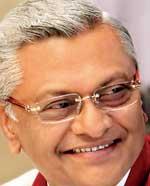
Chamal Rajapaksa
Given the other challenges he had to undertake, the soft-spoken former minister cum reputed former speaker perhaps might not have so far had a good opportunity to promote an ICT agenda. If I am not mistaken, he has been instrumental in rapid computerisation of Parliament of Sri Lanka during his term, including frequently updated and informative website www.parliament.gov.lk.
Dhammika Perera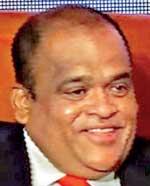
Artificial Intelligence (AI) – now the term has become synonymous with his name. He may not be a techie but Dhammika Perera is certainly not joking when he talks about AI. It is far more than a buzzword.
AI will be the force that will be driving our lives in the near future, in ways we cannot even fathom now. The issue is – it is difficult to explain how to a society that has not seen at least one-hundredth of its capabilities. AI is so unprecedented that there is no possible analogue equivalent example. Any attempt to explain the impact of AI starts sounding like an Isaac Asimov short story.
AI today is not AI yesterday, which we now term as ‘routine technology’. For example, Optical Character Recognition technologies are frequently excluded from things considered to be AI. It is too simple a task for a machine. Speech recognition or Natural-Language Understanding still remains in the basket but will soon be eliminated. We think of far higher achievements, such as analysis of Big Data and taking useful decisions based on that.
So, when somebody says he plans using AI for solving the national-level issues, we must know it goes far beyond mere digitalisation.
Is this AI dream practical? This is a difficult question to answer. A fact: some countries are now not only using AI to best of their advantage but also pumping billions of dollars into further research. China is perhaps the best example. China’s tech giants, such as Baidu, Alibaba, Tencent and Huawei, are progressively investing in AI research and related development. By 2025, the target is the AI core industry in China to reach US $ 60 billion, with a value of over US $ 750 billion when accounting for related industries.
Other than industry, as the Chinese president recently emphasised, the areas of utilisation are governance and public security. China’s manufacturing, agriculture, forestry and fishing, wholesale and retail, financial services, transportation and storage, accommodation and food services with utilities have been predicted to show an additional growth of 1.5 percent-2 percent in the next few years, resulting in an increase of 1.6 percent in an overall GDP growth rate by 2035, in terms of gross value added.
Apart from China, the UAE has become the world’s first nation to appoint a government minister dedicated to AI, in a bid to become the world’s most prepared country. These are extreme examples but just demonstrations of the prominence of AI in transforming a nation, even a developing one, if we treat it seriously.
Said that, getting it going on ground level is an entirely different matter. Many prerequisites must be fulfilled before stepping into such an ambitious AI dream but given the will, it is not something impossible, particularly for a true achiever.
Gotabhaya Rajapaksa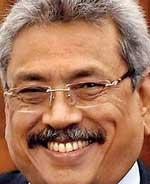
Retired Lieutenant Colonel Gotabhaya Rajapaksa perhaps holds the highest education qualifications in ICTs among all possible contenders for the highest post in the land. He completed a postgraduate degree in IT at the University of Colombo in 1992, says his Wikipedia page, before moving to the USA, where he worked till 2005, as a Unix System Administrator, gaining hands on ICT experience.
That exposure, we have seen repeatedly, has immensely helped him in his efforts in conclusively defeating LTTE terrorism. The attempts involved a complete revamp of the security structure that included comprehensively upgrading IT systems of all three forces, in terms of both technical and human resources. Sadly, most these efforts have gone unrecorded and not known to the public. Even otherwise comprehensive C.A. Chandraprema’s ‘Gota’s War’ does not touch this specific point.
One of the most significant and innovative achievements of Rajapaksa was the launch of the defence.lk website. Till then, the key source of North-East conflict information has been Tamilnet. While it maintained a visible bias, Tamilnet has been largely accurate with figures. They knew precise information was the key for site credibility. It wasn’t just the Tamil diaspora that referred to it for information. Almost anyone from South seeing information did.
What defence.lk did was to challenge that paradigm. For the first time, a reliable and quick news source was introduced. Starting from scratch, it took only three months for defence.lk to beat Tamilnet in Google page hits. It was probably the first defeat of LTTE – long before it lost on ground.
Gotabhaya Rajapaksa’s leadership is right at the moment critical in ensuring national security both in virtual space and on ground, using digital tools at its best. The recent 4/21 events have seriously exposed our serious vulnerabilities as a nation. We have also repeatedly seen the necessity to monitor and control social networking platforms on turbulent times.
Threats from extremist Islamic groups take us to new heights. It is apparent such a threat cannot be encountered only on the ground. With the recent developments in virtual space, the battle is there, rather than on ground. The need of the moment is a strong and visionary leadership that can launch such an initiative. That per se, with nothing else, will match him to the present requirements of the nation in a big way.
Karu Jayasuriya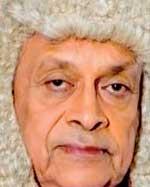
First as Power and Energy Minister, then for a short stint as Public Administration and Home Affairs Minister and a bit longer playing the role of Speaker, he might not have had the ideal opportunities to launch a digital drive.
His achievements, if any, like those of another former speaker Chamal Rajapaksa, is confined to the sphere of Parliament – the website of the same awarded Silver in Government, Bronze in Best Sinhala website and Silver in Best Tamil website in 2018, by Bestweb.lk. In 2017, it has been the best Sinhala and Tamil website with Silver in Government. Two years back, it won Gold in all three categories.
Maithripala Sirisena
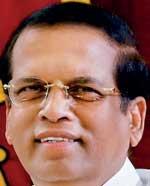 President Maithripala Sirisena is perhaps the leader who benefitted mostly from the digital age. His victory against a rival who easily dominated traditional media – be it print or broadcast – with a more planned, more organised and better delivered strategy was possible only with a swarm of young voluntary activists promoting his cause in social media. Sadly, since his victory, this group has rarely been in his spotlights.
President Maithripala Sirisena is perhaps the leader who benefitted mostly from the digital age. His victory against a rival who easily dominated traditional media – be it print or broadcast – with a more planned, more organised and better delivered strategy was possible only with a swarm of young voluntary activists promoting his cause in social media. Sadly, since his victory, this group has rarely been in his spotlights.
He is keen on addressing the issues important to older and rural communities. The free Wi-Fi zones, a prominent assurance in his manifesto, still after four and half years, remain to be implemented beyond not too practical pilot projects. On the wake of communal violence, President Maithripala Sirisena, also more than once, initiated temporary blocking of selected social media platforms, which sometimes went too far annoying the regular users.
Still those per se do not make him a tech averter. Some projects he initiated were with clear ICT focus. Few weeks back, the leading telecom service provider Sri Lanka Telecom – on his guidance, presented a National Digital Roadmap for the nation. The ‘Smart Sri Lanka’ project on career guidance – another initiative by the President’s Office – works towards curbing youth unemployment by providing job opportunities using ICT facilities best. This creates a ‘job bank’ for use of educated youth to be absorbed to the private sector.
Perhaps thanks to his professional media team, President Maithripala Sirisena also has the best social media presence among all contenders. His Wikipedia page is presented in 44 different languages, including such exotic languages such as Esperanto, Bulgarian, Catalan and Luxembourgish. Need we say more?
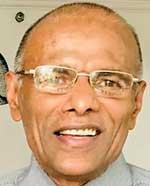
Nagananda Kodituwakku
The focus of this candidate has largely been curbing bribery and corruption. So, in his somewhat comprehensive website, we find almost nothing on this specific subject. Information and communication technologies do have a role in eliminating corruption. One hopes he will note one day.
Ranil Wickremesinghe
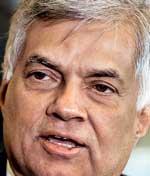 The Indian friends of mine still talk highly about Rajiv Gandhi as the pioneer of digital boom in India. Gandhi lost power in 1989 and was assassinated immediately prior to re-election – i.e. before the IT boom in India took off. That also left P.V. Narasimha Rao to carry out liberalisation with Dr. Manmohan Singh on one side, Chidambaram on other. Still Gandhi was that passionate individual who started it all. In Sri Lanka, our own Rajiv Gandhi could be Prime Minister Ranil Wickremesinghe.
The Indian friends of mine still talk highly about Rajiv Gandhi as the pioneer of digital boom in India. Gandhi lost power in 1989 and was assassinated immediately prior to re-election – i.e. before the IT boom in India took off. That also left P.V. Narasimha Rao to carry out liberalisation with Dr. Manmohan Singh on one side, Chidambaram on other. Still Gandhi was that passionate individual who started it all. In Sri Lanka, our own Rajiv Gandhi could be Prime Minister Ranil Wickremesinghe.
Ranil Wickremesinghe, as Education Minister, was responsible for introducing the first television sets with VCR players and then computers to Sri Lankan schools. Thus, in 1984, began the ICT education in Sri Lankan schools with the Sinclair and BBC models equipped only with BASIC language. They were more like toys. Unlike today, they did not train students for industry needs too. Still, that itself was a great inspiration. It was a right move at the right moment. Even in India, ICT education at schools commenced much later. By then, here those who mastered BASIC programming were entering the world of ICTs with passion and confidence.
Then as Industries, Science and Technology Minister, Ranil Wickremesinghe commenced multiple initiatives, the impact of which is still seen today. He was instrumental in connecting Sri Lanka to the international submarine cable SEA-ME-WE (Then only one, so no numbering). The local newspapers published photos of him with an elephant carrying the cable at Galle Face Green to be connected to the link coming from the seabed.
Another achievement of him in the same portfolio was the first INFOTEL ICT trade exhibition, at the BMICH in 1993. That was the first time ICT was seriously introduced to the Sri Lankan public. The exhibition was remembered for ages – for its popularity. More than a million visitors have attended it for seven days.
Then in 2002, as Prime Minister again, he launched the e-Sri Lanka programme, supported by the World Bank. The Information and Communication Technology Agency (ICTA) was setup as the implementation body, replacing the Council for Information Technology (CINTEC). Eran Wickramaratne, the present Finance State Minister, was ICTA’s first Chairman.
E-Sri Lanka was an ambitious six-strategy programme to leapfrog Sri Lanka into the digital sphere. The success and outcomes of various e-Sri Lanka components are a matter that can be discussed separately. It is also a different question whether as a whole or within the individual components it did justice to massive investments, first by the World Bank and then the Government of Sri Lanka. Still e-Sri Lanka remains the key ICT for development initiative so far Sri Lanka has ever launched.
In addition, as Prime Minister, he also launched ‘SmartGov’, the first e-government initiative in Sri Lanka, way back in 2002, digitalising the old-fashioned state sector. This was a replication of the project with the same name first implemented by Chief Minister Chandrababu Naidu in Andra Pradesh, India. More recently, in the document Vision 2025 introduced towards the end of his fourth term, Prime Minister Ranil Wickremesinghe dedicates the ninth chapter for technology and digitalisation as the ‘country needs to develop strategies that encourage the use of digital and other emergent technologies to become globally competitive and to drive the nation towards a digitally empowered economy’. This chapter talks, among other things, about encouraging transfer of appropriate foreign technologies (sic), private sector investment in digital technology, ICT literacy, national digital identity, digitalisation of government operations, ICT-based marketing interfaces, intellectual property and legal framework for electronic transactions.
He could have won more youth confidence if he planned the programme of distribution of tabs to A/L students a bit more carefully and focussed on offering free Wi-Fi, both strong election promises.
Rohan Pallewatte
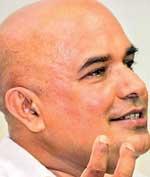 According to his website, Rohan Pallewatte commits himself to transform Sri Lanka into a knowledge-based society through integration of ICTs, creating an environment conducive to ICTs, building ICT infrastructure, establishing a high-speed fibre optic backbone network, setting up multipurpose community tele-centres and also an innovation centre.
According to his website, Rohan Pallewatte commits himself to transform Sri Lanka into a knowledge-based society through integration of ICTs, creating an environment conducive to ICTs, building ICT infrastructure, establishing a high-speed fibre optic backbone network, setting up multipurpose community tele-centres and also an innovation centre.
He has identified five focus areas that include: skills development, private sector development, community development, e-government and cybersecurity. In addition, technology is recognised as a key driver across many other areas, most notably education and energy. The proposals look futuristic and practical, though not necessarily customised to the local conditions.
Sajith Premadasa
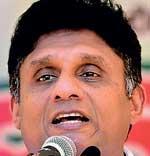 With HFV – His Father’s Voice, still the key element in his campaign, one is yet to hear anything on a digital agenda. Given his times, that can be treated pre-historic in the ICT context, President Ranasinghe Premadasa’s attention too was on many things other than that.
With HFV – His Father’s Voice, still the key element in his campaign, one is yet to hear anything on a digital agenda. Given his times, that can be treated pre-historic in the ICT context, President Ranasinghe Premadasa’s attention too was on many things other than that.
Still with his open mind and dynamic leadership, Sajith Premadasa has full capacity of commanding an islandwide programme transforming the country, no doubt. For his credit, among all the contenders, he perhaps has the most dynamic social media team.
(Chanuka Wattegama, an academic with over 10 years of experience in teaching information systems and a policy researcher, can be reached at chanuka@hotmail.com. The opinions above are his own and do not reflect those of any organisation he is affiliated to)
Nilmini Gunasekara Sunday, 22 September 2019 02:40 PM
sajith is the suitable candidate from a u.n.P. He will be Win Definitely.

Add comment
Comments will be edited (grammar, spelling and slang) and authorized at the discretion of Daily Mirror online. The website also has the right not to publish selected comments.
Reply To:
Name - Reply Comment
US authorities are currently reviewing the manifest of every cargo aboard MV
On March 26, a couple arriving from Thailand was arrested with 88 live animal
According to villagers from Naula-Moragolla out of 105 families 80 can afford
Is the situation in Sri Lanka so grim that locals harbour hope that they coul